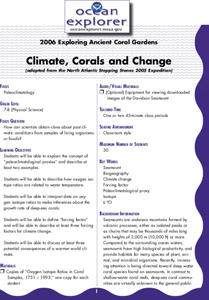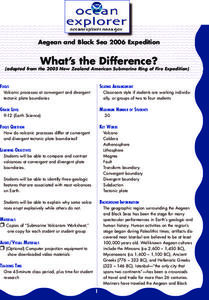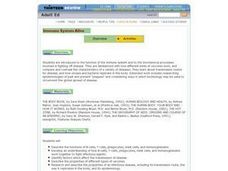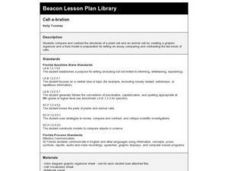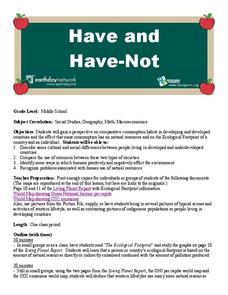Channel Islands Film
Santa Cruz Island - Writing for Information
After re-viewing a documentary segment on the restoration of Santa Cruz Island,, individuals craft an essay in which they compare the views of the various stake holders featured in the video and identify the point of view they find the...
Thoughtful Education Press
Compare and Contrast
Encourage readers to compare and contrast the information that they find in informational text with a variety of reading passages and worksheets. Learners read all about subjects in science, social studies, and literature before...
National Science Teachers Association
Hop into Action
Young scientists find out what makes amphibians such unique and interesting animals in this simple life science lesson. After looking at pictures and discussing the characteristics of amphibians, learners complete a series of three Venn...
Curated OER
Down in the Dumps
After an introduction to municipal sludge, middle school ecologists consider the pros and cons of dumping in the Hudson River Canyon. The class is split into two groups: one to debate in favor or dumping and one to debate against the...
Curated OER
Science vs. Science Fiction
Learners acknowledge the difference between science and science fiction through a compare/contrast activity. They discuss their reading materials together. Students identify characteristics specific to science fiction.
Curated OER
Oil and its Everyday Uses
Explore the properties of oil through an experiment. They use the scientific process to investigate oil, participate in experiments, watch videos,and use information from the internet to determine how oil has changed our everyday lives.
NOAA
Climate, Corals and Change
Global warming isn't just an issue on land; deep ocean waters are also showing troubling signs. Young scientists learn more about deep water corals and the many recent discoveries researchers have made. Then they examine data related to...
Curated OER
Now You See Me, Now You Don't
Bioluminescence fascinates most upper elementary scientists. Display images of different glowing deep-sea organisms and discuss their environment. Young biologists then experiment with images and different colors of filtered light. In...
Kenan Fellows
Determining Stream Health by the Diversity and Types of Benthic Organisms
How diverse are the benthic organisms found in local streams? Using the information learned in previous lessons on identification of macroinvertebrates and on calculating stream index values, groups determine the health of local streams....
Curated OER
Venerable Inventors
Students discuss important historic inventors and read their biographical information. In this world history lesson, students describe Alexander Bell, Thomas Edison, and Guglielmo Marconi using vocabulary terms used in their text....
Curated OER
What's the Difference?
Students investigate volcanic processes at convergent and divergent
tectonic plate boundaries. They read and analyze diagrams, complete a worksheet, and write an essay.
Curated OER
Themes to Encourage Awareness of Environmental Changes on the Shoreline of Connecticut in Elementary School Students: The Case of Kelsey Island
Students begin the lesson by developing a map of Kelsey Island by following specific instructions. In groups, they are given a block of ice in which they tie a rope around and drag over various rocks for different distances. They...
Curated OER
Immune System Alive
Students examine the function of the immune system. They read and discuss text, complete a K-W-L chart, sequence photos of white blood cells encountering bacteria, develop an outline, and write an essay.
Curated OER
What's Shaking?
In this Earth movements worksheet, students compare and contrast earthquakes and volcanoes. Students write a short essay about the similarities and differences and then complete 4 matching questions.
Curated OER
Cell-a-bration
Fifth graders study the structures of a plant cell and animal cell. They create a graphic organizer and a food model. Finally, they write an essay comparing and contrasting plant and animal cells.
Curated OER
Spermatogenesis versus Oogenesis
Students compare and contrast the processes of spermatogenesis and oogenesis. This lesson plan uses the KWL+ strategy to promote reading. The + used here is the Venn diagram.
Curated OER
Alien Invasion!
Students compare and contrast invasive, alien and native species. They research three problems that might be associated with invasive species. They describe how some invasive species came to be invasive and discuss what can be done about...
Curated OER
What is an Organism?
Sixth graders take a pre-test and summarize teacher's discussion of cells, tissues, organs in their notebooks. They read selections on organisms in their textbook and perform a dissection of a chicken drumstick with the thigh attached....
Curated OER
Plants 1: Plant Parents
Students review their prior knowledge on plants. In groups, they compare and contrast the difference between reproducing asexually and sexually. Using the internet, they research how some plants can be forced to produce asexually.
Curated OER
Design a Reef!
Students design a functional model of a coral reef ecosystem. In this coral reef lesson plan, students identify the energy sources and material cycles of a coral reef. They write an essay about their niche in their own ecosystem.
Curated OER
Our Eye in the Sky: The TIROS Weather Satellite
Students investigate the political context of the creation of a weather satellite. For this technology and society lesson, students explore the historical, technological, and political context of the TIROS weather satellite. They write a...
Curated OER
Science Mystery: The Vinland Map
Students research proof regarding the authenticity of the Vinland map. In this geography instructional activity, students hold a debate based on their research findings. They discuss which side won and write a short essay about their...
Curated OER
Environment: The Haves and the Have Nots
Students examine consumption habits in developed and developing countries and determine their effects on natural resources. In groups, they assess graphs on the Living Planet Report and observe the connection between consumption and...
Curated OER
2005 Hidden Ocean Expedition What's Eating You?
Analyze data and make inferences about the trophic position of organisms in the Canada marine food web. After a review of the geography and formula, discuss results and write an essay to improve the understanding of Artic food webs.








